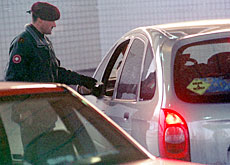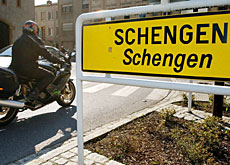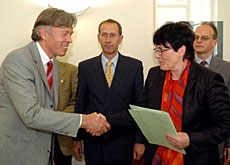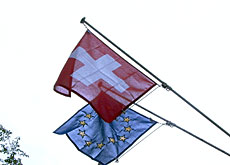Cantons back Schengen deal

Switzerland’s regional authorities have thrown their weight behind a second set of bilateral treaties with the European Union, which include closer ties on security and asylum.
Only the rightwing Swiss People’s Party has challenged the government’s proposal to ratify the Schengen/Dublin accord.
The country’s 26 cantons came out on Friday in favour of the nine separate dossiers, and in particular the agreement on closer police cooperation with EU member countries.
“Switzerland can’t afford to stand on the sidelines amid international efforts to coordinate the fight against organised crime,” they said in a statement.
They added that the accord would make it easier for some foreigners living in Switzerland to travel to Schengen countries.
However, the cantons warned the federal authorities against attempts to use the Schengen accord to undermine cantonal autonomy.
“We expect the federal authorities to consult us and cooperate with us on legal issues concerning the Schengen agreement,” they said.
Consultation
As part of a regular consultation procedure, the cabinet had asked all parties and organisations to state their opinion on the new set of accords with Brussels.
The nine treaties, which make up the second set of bilateral accords with the EU, include closer cooperation on security and asylum (Schengen/Dublin), customs fraud and the taxation of EU residents’ savings income in Swiss banks.
Education and vocational training programmes, membership of the European Environmental Agency, free trade of processed agricultural products, and access to pan-European statistics as well as media are also part of the deal.
Broad agreement
Three of the main political parties as well as the Swiss Business Federation, economiesuisse, and the Federation of Trade Unions have already come out in favour.
However the rightwing Swiss People’s Party has pledged to challenge the Schengen agreement in a nationwide vote.
It said the accord was a first step towards full membership of the EU and accused the government of leaving the country open to a wave of criminal foreigners.
There are also reservations among other political parties, notably the Left, and from trade unions over discrimination against non-EU citizens, Switzerland’s insistence on preserving banking secrecy and data protection.
But business leaders say the new bilateral accords could facilitate business trips and boost tourism.
The treaties are expected to be signed in October, and parliament is due to discuss them before the end of the year.
If the People’s Party succeeds in collecting enough signatures for a nationwide vote on the Schengen accord, the Swiss electorate will have the final word in June next year.
A first set of bilateral treaties between Switzerland and the EU, mainly on trade, labour and transport issues, came into force in 2002.
The Swiss government has ruled out full EU membership in the near future, but has pledged to review the situation before 2008.
swissinfo
Switzerland’s 26 cantons have come out in favour of a second series of bilateral treaties, but warned against any loss of their autonomy.
Three of the main political parties, the business community and the trade unions have also given the green light to the treaties.
The rightwing People’s Party has threatened to challenge the Schengen accord in a nationwide vote, if parliament approves the treaties later this year.
The Schengen/Dublin accords govern closer cooperation on security and asylum.
The agreement is one of a set of nine bilateral accords agreed after two years of negotiations.
A first series of bilateral agreements came into force in June 2002.

In compliance with the JTI standards
More: SWI swissinfo.ch certified by the Journalism Trust Initiative



You can find an overview of ongoing debates with our journalists here. Please join us!
If you want to start a conversation about a topic raised in this article or want to report factual errors, email us at english@swissinfo.ch.